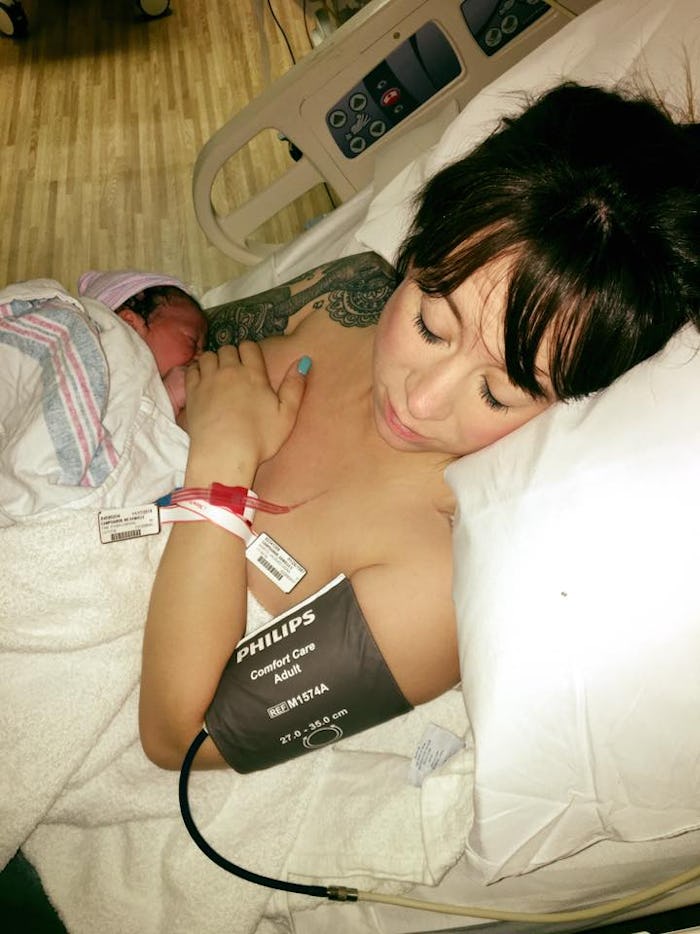Life

Forgive Me If I’m Not Sold On The Postpartum Depression Wonder Drug
Like an estimated one in nine new moms, I am currently suffering from postpartum depression. And like many of those same moms, I've been struggling to adequately treat my depression since my 4-month-old son was born. So imagine my cautious optimism when the FDA unveiled an approved "wonder drug" for postpartum depression, as reported on by USA Today. The so-called miracle fix for my post-pregnancy problems, called Brexanolone but sold as Zulresso, is said to "work fast" — in just two days, or 60 hours of intravenous medication. It also costs upwards of $20,000. You'll have to forgive me if I'm a little skeptical.
Most treatment options for postpartum depression, like oral medication and therapy, take time to work; a truth I am currently living. So the idea that a depressed mom like me can be "cured" in two days is relatively alluring, until I realize that billing a $35,000 course of drugs that may essentially put moms to sleep, per the advised side effects, is not a true solution.
After sitting in a 'certified health care facility' being administered this drug under the restricted 'Zulresso REMS Program,' I have to imagine that my social isolation may well get worse.
Even if cost and a potential lack of insurance weren't issues, is a picture of thousands of moms dozing in medical facilities as they endure two days worth of IV treatment I am assuming not without interruption to breastfeeding the solution we have been hoping for? The medical release says the drug is approved for use while breastfeeding, but a zonked mother is not going to be able to hold her baby for hours on end.
Sorry, I see this miracle as indicative of how this country continuously fails mothers. Instead of peddling a "wonder drug," we should be treating the social problems that exacerbate postpartum depression in all women, regardless of whether or not they can afford a high-priced treatment option.
There is no single cause of postpartum depression, according to the Mayo Clinic, but instead a litany of physical and emotional factors — not least of which is a basic lack of sleep. So the idea that a single, high-priced drug can "cure" postpartum depression is nothing more than a slap in the face to moms who are suffering, often in silence. Sleep deprivation, feelings of overwhelm, fears associated with caring for a newborn, a loss of identity, social isolation, and a loss of control can all contribute to postpartum depression, according to the Centers for Disease Control and Prevention. A two-day drug cannot and will not eradicate those things. And after sitting in a "certified health care facility" being administered this drug under the restricted "Zulresso REMS Program," I have to imagine that my social isolation may well get worse.
Sure, I’m not a psychiatrist, but I have two of those depression-inducing babies researchers are talking about. And those depression-inducing babies have taught me that it's not my body, or my babies, that are failing me: it's my country. Even if this drug helps some narrow slice of women experiencing serious postpartum depression, there are many other fixes we could offer everyone else, not to mention opportunities for early detection and ways we could work to prevent perinatal mood and anxiety disorders.
Firstly, we should be addressing depression in pregnancy. An estimated 25 percent of cases of "postpartum" depression begin during pregnancy, according to Harvard Medical School, yet rarely are pregnant women screened for prenatal depression.
We should provide paid family leave so that fathers can share the burden when it comes to night feeds and around-the-clock care in those early weeks.
We should check in early and often with new moms, instead of wheeling them out of the hospital with no postpartum care until the 6-week checkup. And we should provide social support for the reported 25 percent of new moms who go back to work a mere two weeks after giving birth, according to a survey by In These Times.
Instead of peddling another synthetic fix, we should be de-stigmatizing postpartum depression, as well as depression in general, so that every mom feels comfortable seeking the treatment they need and deserve; treatment that, yes, does take time, but is always time well spent.
So while it's lovely to envision a two-day wonder drug, I can't help but feel pessimistic and angry that this so-called break-through even exists. Because the lack of support for new parents in this country isn't a two-day thing: it's something we pass on from generation to generation.
If you or someone you know is experiencing depression or anxiety during pregnancy, or in the postpartum period, contact the Postpartum Health Alliance warmline at (888) 724-7240, or Postpartum Support International at (800) 944-4773. If you are thinking of harming yourself or your baby, get help right away by calling the National Suicide Prevention Lifeline at 1-800-273-8255, or dialing 911. For more resources, you can visit Postpartum Support International.